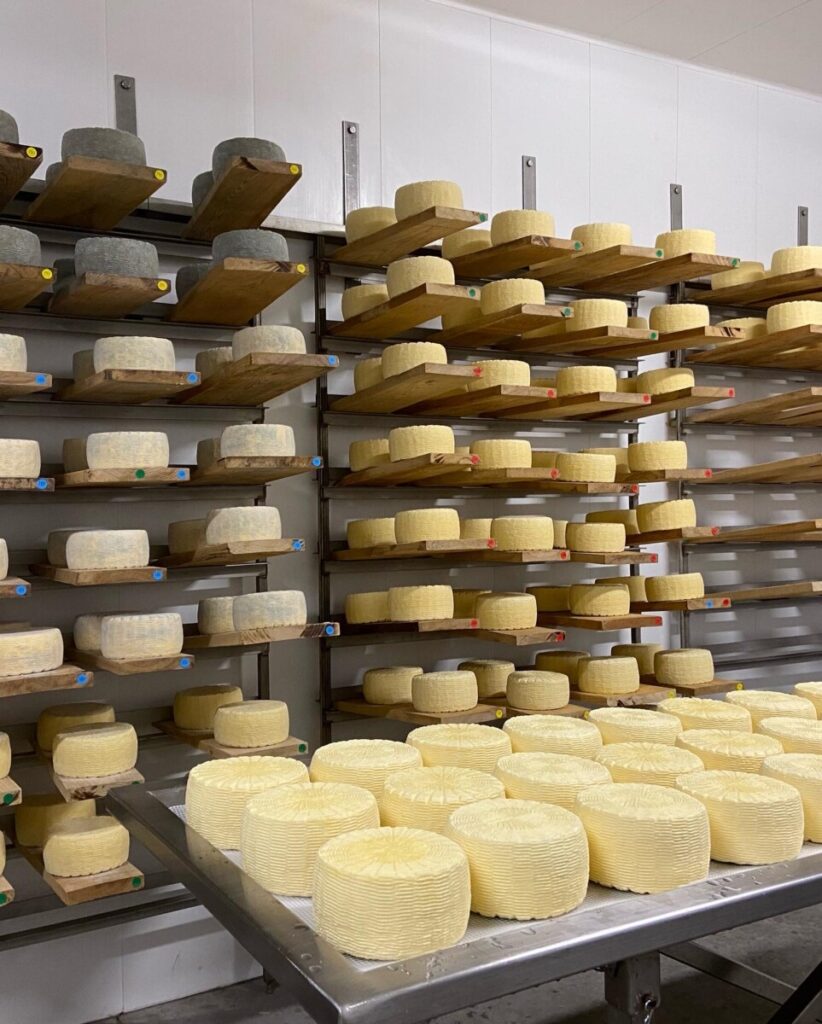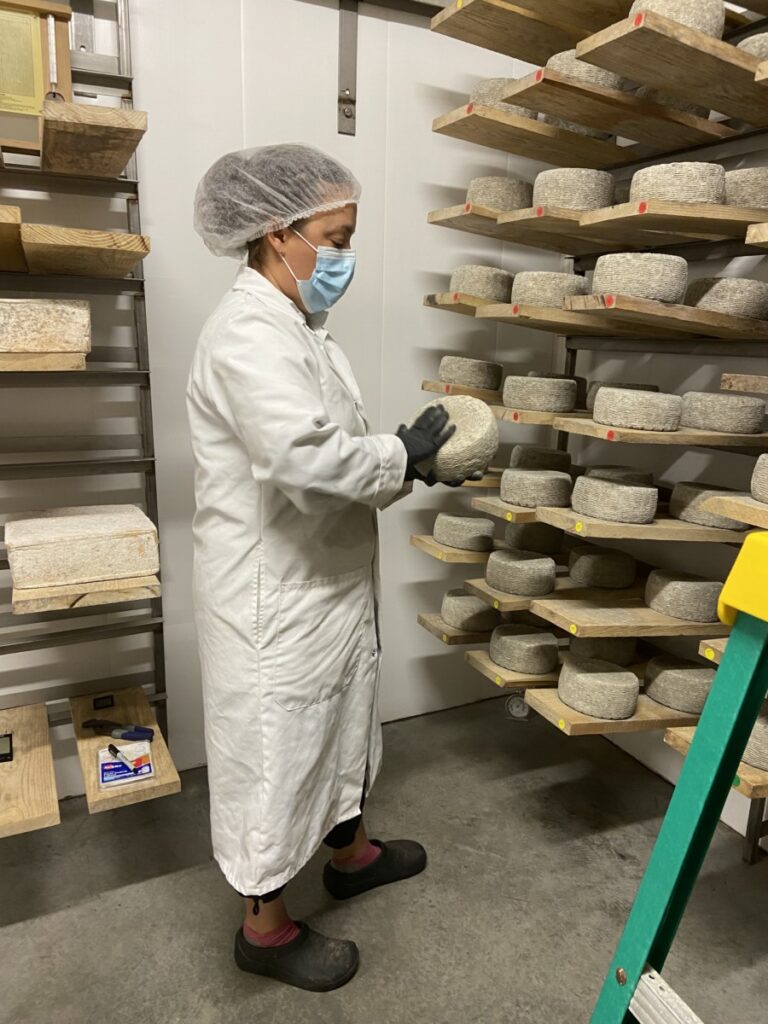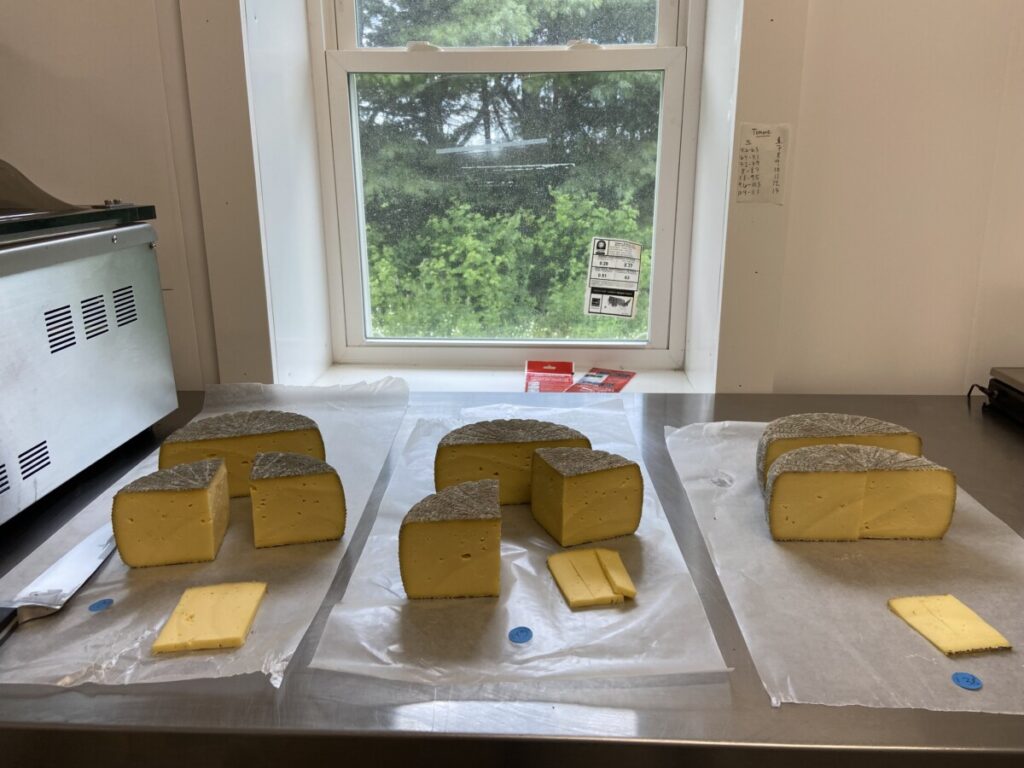Rule 28 is “Cheeses, like children, must be raised.” This rule deals with what happens after the cheese has been made and now needs to be aged. What comes next is affinage, which is the French term for cheese aging. An affineur is the person who works in the cheese aging cave and, as Anne writes, “is responsible for maturing or aging cheese to its perfect expression of flavor and ripeness.”

At Stony Pond Farm, I have been lucky to get a lot of exposure to the cheese aging process. Melanie’s cave is a large (approximately 18’ x 24’) walk-in refrigerated room set to about 55 F and 95% humidity. Cheese likes a cool, damp environment because it allows the cheese to develop properly. The room has three walls of metal cheese aging racks where boards made of ash wood can be hung to hold the aging cheese. The boards must be washed with soap and a scrub brush, fully air-dried, and then pasteurized in a 170 F oven for an hour before they can be hung in the racks. The cave has a smooth cement floor and the walls are covered in white plastic anti-bacterial wall paneling.
The main thing I do in the cave every day is to wipe or pat down the cheese and then turn it. I don a long lab-type coat, put on a mask (so as not to breathe in the mold particles) and put on disposable kitchen gloves. When a newer cheese just starts to bloom (the mold begins to grow on it), the affineur aims to control this bloom. Nobody wants a wheel of cheese with a hairy or fuzzy rind. So my job has been to lightly brush down the sides with a glove-covered hand in order to control the mold growth. I also am responsible for turning or flipping the wheels so that they settle evenly and don’t form a “muffin top.” Melanie has me pat down and turn the Tom Tom camemberts once a day and the Swallow Tail tommes once every other day. Once the tommes get to about the 45 or 50 day mark (raw milk cheeses must be aged for at least 60 days before sale), the person working in the cave starts to brush them. Melanie uses delicate sensory brushes to do this. This stops most of the mold from developing. They are brushed again right before packaging so that the cheese is less moldy or dusty for the customer.

In each batch of 32 tommes, Melanie selects a smaller sized wheel for periodic testing, usual one that is closer to three pounds. She uses a cheese trier to see how the cheese is developing throughout the 60 day aging process. Then she plugs the hole back up and allows it to continue to age.
When Blair, a cheesemaking consultant who Melanie works with, was at SPF recently, we tasted three different makes of tommes (one from May 18, one from May 27, and one from June 2) to see how they were developing and see if there were any notable differences between the makes. They all tasted almost identical, with the oldest one tasting every so slightly sharper. The May 18 cheese also had a lot more holes in the top side of the cheese, which Blair stated was because Melanie waited a bit too long to flip the cheese for the first time. But it was neat to see the consistency between the cheeses.

Personally I have found the affinage tasks to be a bit tedious and repetitive at times. The tommes are around 5 pounds each, so lifting, wiping, twisting and turning between 200 and 300 cheeses a day takes a physical toll. Since I have been at the farm, my carpal tunnel syndrome flared up. I started wearing wrist guards at night and taking an anti-inflammatory to help with the pain. I also have modified how I handle the cheese to make sure I am not overworking my wrists, which has helped greatly. I have also started downloading podcasts to listen to in the cave to keep me engaged and to help the time pass. Affinage is definitely not the most exciting part of the cheesemaking process and I will probably not be pursuing a career as a master affineur anytime soon, but I understand the importance of the process and have great respect for people who do this work day in and day out.


